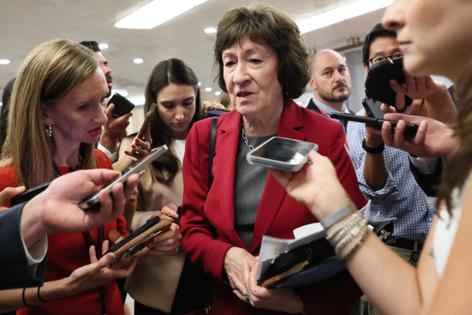Stopgap fix or separate bill may be needed to unlock shutdown pay
Published in Political News
WASHINGTON — A draft memo from White House budget office counsel arguing there’s no obligation to pay furloughed workers after a government shutdown may have some legal merit in at least one procedural aspect, even critics acknowledge.
To guarantee retroactive pay when the shutdown ends, Congress might need to either amend the current House-passed stopgap funding measure or pass subsequent legislation that includes the fix, according to sources familiar with budget law on both sides of the aisle. Either option could create another headache for Speaker Mike Johnson, R-La., who narrowly muscled the bill through his chamber last month, unless lawmakers are able to quickly pass legislation by unanimous consent.
This view isn’t held universally, however. A Democratic aide said the prevailing legal opinion on that side of the aisle is that a January 2019 law guaranteeing retroactive pay is “unambiguous,” and the only thing that needs to happen is for stopgap funding to be enacted.
The legal argument outlined by the Office of Management and Budget’s Mark Paoletta is that furloughed workers should be treated differently from “excepted” staff working without pay in a shutdown under the 2019 law.
Paoletta writes in his draft memo, addressed to OMB Director Russ Vought, that the government didn’t incur any obligation to pay furloughed staff because they weren’t providing goods and services to the government at the time.
He points to a subsequent stopgap funding law — enacted nine days later, ending the 2018-19 shutdown and providing the necessary appropriations to fund back pay for furloughed workers — as evidence the financing isn’t automatic.
“The legislation that ends the current lapse in appropriations must include express language appropriating funds for back pay for furloughed employees, or such payments cannot be made,” Paoletta writes in the draft memo.
Of course, lawmakers in 2019 pushed through the retroactive pay law precisely to avoid having to deal with ensuring that both furloughed and excepted federal workers receive payment for time lost to a shutdown. And on Tuesday, Democrats reacted harshly to the OMB memo.
Sen. Chris Van Hollen, D-Md., who co-authored the 2019 law, said Tuesday it is “crystal clear” that no additional legislation is needed to provide back pay to furloughed employees.
“I looked at it again today, after the White House comments, and they are blowing smoke,” he said. “This is part of their effort to scare people, so this is all part of their fear mongering.”
‘Appropriated entitlement’
But even some who disagree with Paoletta’s argument believe he has a point that reopening the government in and of itself may not be sufficient to ensure furloughed workers get paid.
Bobby Kogan, a federal budget expert with the left-leaning Center for American Progress, said Paoletta was wrong in the sense that it is not optional to pay furloughed workers. Rather than being a simple “authorization,” as Paoletta wrote, Kogan said the 2019 law established what’s known as an “appropriated entitlement,” which creates a legal obligation to pay.
However, like other appropriated entitlements, including food stamps and Medicaid, it requires a separate appropriations law to provide the actual funding to ensure the benefits flow.
That’s partly why Congress amended the retroactive pay law shortly after, to make clear it was not a “mandatory” benefit, but would in fact be “subject to the enactment of appropriations Acts” to end shutdowns.
“Congress needs to formally kick the money out the door usually,” said Kogan, a former Senate Budget Committee Democratic aide and adviser to the Biden administration OMB.
Senate Appropriations Chair Susan Collins, R-Maine, said she believes the 2019 law settled the matter, and that workers should receive their pay automatically. But she allowed that as a “backup,” Congress could appropriate the retroactive pay separately.
It’s the same reason why, despite being an entitlement benefit, Supplemental Nutrition Assistance Program funding could run out unless stopgap legislation passes. The Agriculture Department’s contingency plan says SNAP benefits will go out “subject to the availability of funding,” of which there was enough to make the October payments. But once the money dries up, food stamps might not get paid out.
Kogan said that in the absence of new appropriations, furloughed workers would still have a legal right to back pay. But that would have to come through time-consuming proceedings at the U.S. Court of Federal Claims.
Instead, it’s much simpler to do what Congress has done in past shutdowns, which is to write “startup” language into a reopening stopgap bill that “creates an allowable use” of funds for retroactive worker pay, according to Kogan.
Typical startup provisions cover obligations incurred during a shutdown, including to pay federal employees and reimburse states for costs that would have been financed by the federal government. That language is not currently in the House-passed continuing resolution since, naturally, it was written before the shutdown began.
“Once you’ve done the normal startup language you don’t really need the (2019) law in the first place unless Russ Vought is saying, ‘I don’t feel like it, I’m going to do it optionally in some cases but not other cases,’” Kogan said.
_____
(John T. Bennett and Aidan Quigley contributed to this report.)
©2025 CQ-Roll Call, Inc., All Rights Reserved. Visit cqrollcall.com. Distributed by Tribune Content Agency, LLC.
























































Comments